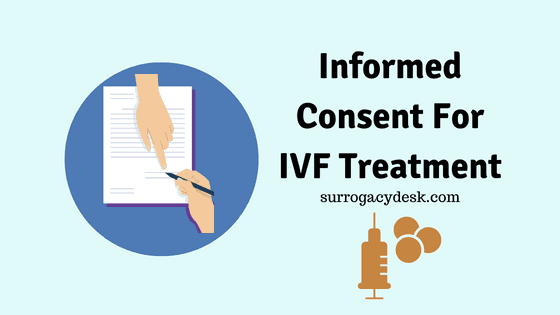In-Vitro Fertilization (IVF) has become a longtime remedy for plenty forms of infertility. The usual aim of IVF is to allow a patient to become pregnant using her very own oocytes (eggs) and sperm from her partner. In a few cases, donated sperm or oocytes can be used. Certain sufferers would require the participation of a gestational carrier (surrogate mother). Voluntary and informed consent of the couple regarding the whole process and its complication & restrictions are mandatory before these procedures.
IVF is an optional technique designed to outcomes in the patient’s being pregnant when different treatments have failed or are not appropriate. This consent evaluations the whole IVF process, which include the risks that this treatment may pose to you and your offspring. In addition to those known risks, there can be dangers with IVF which have now no longer but been installed or maybe suspected. Informed consent to treatment is an ethical requirement frequently misunderstood or not absolutely preferred through physicians. The cause of acquiring informed consent is to make certain that patients know what doctors suggest to do and freely grant their permission. Although the reason of informed consent and the requirements by which it is to be employed are the identical in all regions of clinical practice, special issues get up in assisted reproduction. Voluntary, informed consent is an example of a reproductive right that has to be identified by the worldwide medical community.
What does an IVF Cycle include?
- Medications to develop more than one eggs
- Retrieval of eggs from the ovary or ovaries
- Insemination of eggs with sperm
- Culture of any ensuing fertilized eggs (embryos)
- Placement (“transfer”) of 1 or more embryo(s) into the uterus
- Support of the uterine lining with hormones to allow and maintain pregnancy
In certain cases, these extra methods may be employed: - Intracytoplasmic sperm injection (ICSI) to growth the risk for fertilization
- Assisted hatching of embryos to growth the risk of embryo attachment (“implantation”)
- Embryo Cryopreservation (freezing)
Benefits Vs Risks of IVF treatment
- Degeneration, damage or lack of the egg or embryo, which precludes in addition use.
- Possible unusual fertilization. The ICSI technique may bring about damage to the egg causing it to expand abnormally.
- Possible failed fertilization. Even with the usage of ICSI, it’s far viable that fertilization will not occur.
- Studies have proven that a few cases of male infertility can be genetic. Therefore, there’s the possibility that infertility can be passed directly to the offspring. Some research display an increased risk of chromosomal and different abnormalities in infants born because of the ICSI technique. If pregnancy is achieved, testing may be carried out to determine the chromosomal makeup of the fetus. Would like additional information concerning genetics and inheritance, you should ask your physician to refer you to a genetic counselor previous to the start of your treatment cycle.
- Other, presently unforeseeable, risks and side effects might also additionally occur.
Informed Consent for treatment & Storage
Before treatment can take place, required by law to provide your informed written consent to make sure sperm, eggs, embryos are used and saved in a manner which you are satisfied with. Find out greater approximately why giving consent is so important and the different forms of consent.
Why is consent to treatment and storage important?
If consent to treatment or storage isn’t well given it may have serious implications for a way embryos, eggs or sperm are used and stored, and in a few cases, who is considered to be a legal parent of your baby. Mistakes with consent to treatment or storage have, for example, caused embryos, eggs or sperm being destroyed because right consent to storage wasn’t given. If having treatment with donated sperm or embryos and you’re now no longer married or in a civil partnership together along with your partner, giving consent to who might be your baby’s legal parent is vital. Problems with legal parenthood consent have caused couples having to visit court after their infant is born in order that legal parenthood may be declared. It is an essential a part of treatment and, collectively with clinic, should make certain you completely understand all the issues earlier than giving consent.
What is the different consent forms might be asked to sign?
Some of the areas in which may need to provide consent include:
- how lengthy to keep eggs, sperm or embryos
- the type of treatment have, along with donation
- use and storage of sperm, eggs or embryos for training purposes
- who will be the legal parent of a infant born in case you are the use of donated eggs, sperm or embryos and not married or in a civil partnership with partner
- what will happen on eggs, sperm or embryos in case you die
- what is going to occur on eggs, sperm or embryos in case lose the ability to determine for yourself (become mentally incapacitated)
- How your personal information may be used.
Informed consent to fertility treatment and storage of sperm, eggs and/or embryos
Before treatment can take place, it is required through law to offer informed written consent if desired to sperm, eggs or embryos for use or stored for IVF or ICSI treatment. If making plans to storing eggs, sperm or embryos, have to state in writing on a consent form how lengthy consent to them being stored. Only the egg or sperm provider has legal rights over the use or storage in their egg or sperm, or embryos created with their eggs or sperm. Legally required to document what would really like to happen to eggs, sperm or embryos if you have been to die or lose the ability to determine for (turn out to be mentally incapacitated). If you’ve got an associate however do now no longer report your consent on the proper form, in the occasion that die or turn out to be mentally incapacitated, associate might now no longer be capable of use eggs or embryos of their very own treatment with a surrogate. If a surrogate is needed in addition screening is likewise required.
How long can store eggs, sperm or embryos for use in treatment?
The eggs, sperm or embryos aren’t used without delay in treatment, might also additionally want to keep eggs, sperm or embryos in order that they may be used for treatment in the future. stored, eggs, sperm and embryos are frozen. Will need to consider how a long way in the future you would possibly need or be able to use stored eggs, sperm or embryos and the potential charges of storing. Storing embryos, must be aware that embryos can only be stored if both egg or sperm issuer have given consent. This can be associate donor (if donated eggs or sperm were utilized in remedy). The law now allows storing eggs, sperm or embryos to be used in treatment for any length as much as a most of fifty five years from the date that the eggs, sperm or embryos are first located in storage. Crucially for storage to lawfully hold you may want to renew your consent each 10 years. Clinic must have defined this clearly while stored eggs, sperm or embryos.
What happens if does not renew consent to storage at the appropriate time?
If do not renew consent to storage eggs, sperm or embryos can be removed from storage and disposed of after they now no longer may be lawfully stored, so it’s genuinely important keep health center informed of any alternate to contact details so they can permit know when consent to storage needs to be renewed. If do now no longer want to renew consent to storage or to maintain storing eggs, sperm or embryos at any time, then can withdraw consent to storage. Will want to touch clinic and entire the relevant withdrawal of consent form.


How long can eggs, sperm or embryos be used and stored for in the event of partner death?
If do not renew consent to storage eggs, sperm or embryos can be removed from storage an
d disposed of after they now no longer may be lawfully stored, so it’s genuinely important keep health center informed of any alternate to contact details so they can permit know when consent to storage needs to be renewed. If do now no longer want to renew consent to storage or to maintain storing eggs, sperm or embryos at any time, then can withdraw consent to storage. Will want to touch clinic and entire the relevant withdrawal of consent form.
What happens if the partner also separates?
If split up from partner earlier than the embryo(s) are transferred or before insemination, it’s vitally important that both inform to the clinic of partner separation and whether or not want to change or withdraw the consent that previously provided. If both need to change or withdraw consent, will want to do that via way of means of finishing one of the consent forms. If one person wants to use the embryos and the alternative person doesn’t, communicate clinic about whether or not you may be capable of depend upon the one year ‘cooling off duration’. The cooling off duration enables the clinic to continue storing sperm, eggs or embryos despite the fact that one in all has withdrawn consent even as you watched thru all of the problems and are available to a very last decision. By law, the embryos can most effective be used if each events have given their consent. Consent may be withdrawn at any point up till the embryo is transferred to the womb. If one partner withdraws consent, clinic has to take appropriate steps to tell the alternative partner that consent has been withdrawn. If we’re having treatment with donated sperm or embryos and have break up from companion however are still married/in a civil partnership with them, partner might still be taken into consideration the legal parent of any child born until should demonstrate they did not consent to treatment.





